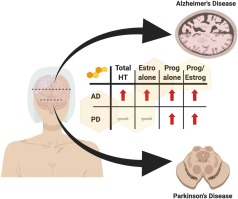Pharmacological Research ( IF 9.1 ) Pub Date : 2020-02-11 , DOI: 10.1016/j.phrs.2020.104693 Minghua Wu , Min Li , Jun Yuan , Sen Liang , Zhaoyao Chen , Min Ye , Paul M. Ryan , Cain Clark , Shing Cheng Tan , Jamal Rahmani , Hamed kord Varkaneh , Akshaya Srikanth Bhagavathula

|
Hormone therapy continues to be a favourable option in the management of menopausal symptomatology, but the associated risk-benefit ratios with respect to neurodegenerative diseases remain controversial. The study aim was to determine the relation between menopausal hormone therapy and Alzheimer's disease, dementia, and Parkinson's disease in human subjects. A literature search was performed in PubMed/Medline, Cochrane collaboration, and Scopus databases from onset of the database to September 2019. Random-effects model was used to estimate pooled odd ratio (OR) and 95 % confidence intervals (CI). Subgroup analysis was performed based on the type and formulation of hormone. In addition, the time-response effect of this relationship was also assessed based on duration of hormone therapy. Associations between hormone therapy and Alzheimer's disease, dementia, and Parkinson's disease in menopausal women were reported in 28 studies. Pooled results with random effect model showed a significant association between hormone therapy and Alzheimer's disease (OR 1.08, 95 % CI 1.03–1.14, I2: 69 %). This relationship was more pronounced in patients receiving the combined estrogen-progestogen formulation. Moreover, a significant non-linear time-response association between hormone therapy and Alzheimer's disease was also identified (Coef1 = 0.0477, p1<0.001; Coef2 = -0.0932, p2<0.001). Similarly, pooled analysis revealed a significant association between hormone therapy and all-cause dementia (OR 1.16, 95 % CI 1.02–1.31, I2: 19 %). Interestingly, no comparable relationship was uncovered between hormone therapy as a whole and Parkinson's disease (OR 1.14, 95 % CI 0.95–1.38, I2: 65 %); however, sub-group analysis revealed a significant relationship between the disease and progestogen (OR 3.41, 95 % CI 1.23–9.46) or combined estrogen-progestogen formulation use (OR 1.49, 95 % CI 1.34–1.65). Indeed, this association was also found to be driven by duration of exposure (Coef1 = 0.0626, p1 = 0.04). This study reveals a significant direct relationship between the use of certain hormonal therapies and Alzheimer's disease, all-cause dementia, and Parkinson's disease in menopausal women. However, the association appears to shift in direct after five years in the context of Alzheimer’s disease, adding further weight to the critical window or timing hypothesis of neurodegeneration and neuroprotection.
中文翻译:

绝经后激素治疗和阿尔茨海默氏病,痴呆和帕金森氏病:系统评价和时间反应荟萃分析
在绝经期症状管理中,激素疗法仍然是一种有利的选择,但是与神经退行性疾病相关的风险收益比仍然存在争议。该研究的目的是确定更年期激素疗法与人类受试者的阿尔茨海默氏病,痴呆和帕金森氏病之间的关系。从数据库开始到2019年9月,在PubMed / Medline,Cochrane合作和Scopus数据库中进行了文献搜索。随机效应模型用于估计合并的奇数比(OR)和95%置信区间(CI)。根据激素的类型和配方进行亚组分析。此外,还根据激素治疗的持续时间评估了这种关系的时间响应效果。28项研究报道了激素疗法与更年期妇女阿尔茨海默氏病,痴呆和帕金森氏病之间的关联。随机效应模型的汇总结果显示激素治疗与阿尔茨海默氏病之间存在显着相关性(OR 1.08,95%CI 1.03–1.14,I2:69%)。这种关系在接受雌激素-孕激素联合制剂的患者中更为明显。此外,还确定了激素治疗与阿尔茨海默氏病之间显着的非线性时间反应关联(Coef 1 = 0.0477,p 1 <0.001; Coef 2 = -0.0932,p 2 <0.001)。同样,汇总分析显示激素治疗与全因痴呆之间存在显着相关性(OR 1.16,95%CI 1.02-1.31,I 2:19%)。有趣的是,在整个激素治疗与帕金森氏病之间没有发现可比的关系(OR 1.14,95%CI 0.95-1.38,I 2:65%); 但是,亚组分析显示该疾病与孕激素(OR 3.41,95%CI 1.23–9.46)或雌激素-孕激素联合使用(OR 1.49,95%CI 1.34-1.65)之间存在显着关系。实际上,还发现这种关联是由暴露持续时间驱动的(Coef 1 = 0.0626,p 1 = 0.04)。这项研究揭示了更年期妇女使用某些激素疗法与阿尔茨海默氏病,全因痴呆和帕金森氏病之间存在显着的直接关系。然而,在阿尔茨海默氏病的背景下,这种关联似乎在五年后直接转移,进一步增加了神经退行性变和神经保护的关键窗口或时间假说的分量。













































 京公网安备 11010802027423号
京公网安备 11010802027423号